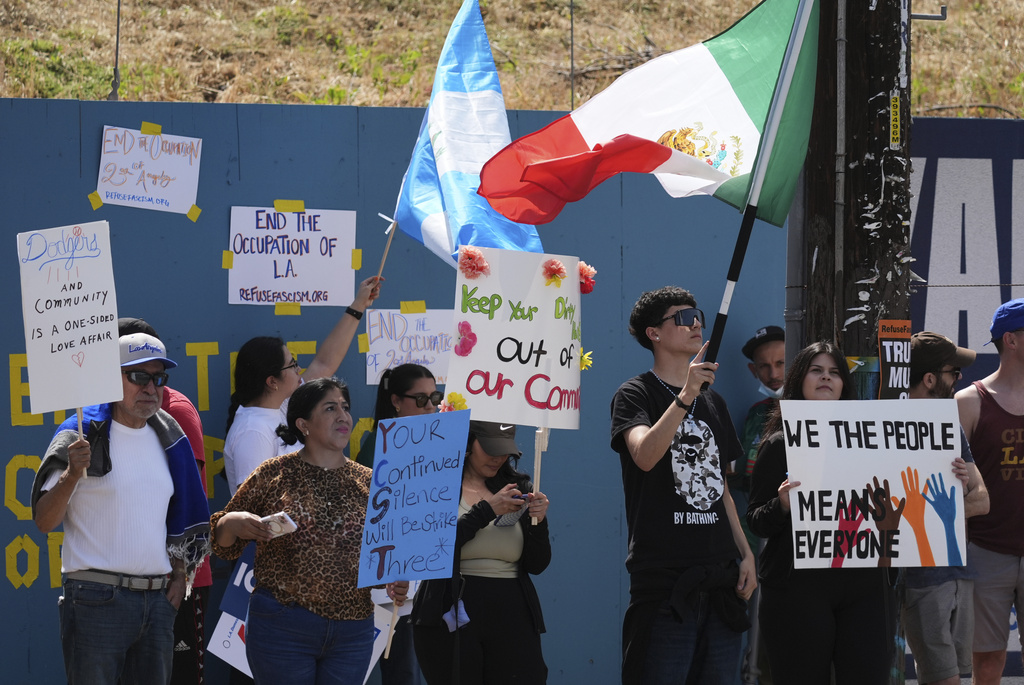ProPublica investigative reporter Mica Rosenberg has specialized in immigration reporting for nearly two decades and previously was part of an EJI panel discussion about covering migrants.
ALISON FRANKEL, SENIOR ADVISOR, ETHICS AND JOURNALISM INITIATIVE: What sort of ethical concerns are at the top of your mind when you go into a story?
MICA: Things that you would think about in any story, in terms of protecting your sources and making sure that people who are sharing information with you are doing it in a way that can give certain levels of protection for them.
But then also, obviously, many of the immigrants that we write about are some of the most vulnerable people in the U.S. Especially if they don’t have legal status, they may not have a lot of knowledge or information about how the U.S system works. And increasingly, this administration has singled out individuals in a way that’s different than in the past. We usually try to avoid granting anonymity to people, but sometimes will refer to people by their first names or their middle names or [use] other ways to protect their identities when there could be serious implications for their immigration status.
ALISON: How do you assure yourself that people understand the risk of talking to you?
MICA: In an ideal situation, it’s a long process with a lot of conversations and a lot of transparency, and also assuring that people understand the language that you’re speaking in. I speak Spanish, but sometimes I’m speaking to people who speak different languages that I don’t speak, or speak indigenous languages. I’ll try to get translators who can speak to them in those cases, so there’s not kind of a game of telephone.
Then I’ll share links to other stories that I’ve done, in cases where people have used their names or where they have been anonymous or when we have photographed people using their faces or where we photographed them concealing their faces. [I’m] trying to show people the range of different options that they have, but then also what it will look like when it’s published.
Our approach to all of our stories is this real no-surprises approach [so] that people are fully aware of what and how things will be published.
I also want to let people know that there could be negative implications so that they can make the decision for themselves if this is something that they want to publicize.
It’s surprising a lot of times. People are scared, but if something really egregious has happened to them, for example, they often do want that out there. They want people to know about it. They want the public to be aware of it.
ALISON: It seems like there’s so much risk in drawing any kind of attention to yourself in this environment. Have people become less willing to talk?
MICA: People have a whole range of motivations for wanting to talk when they realize that the kind of work we’re doing is very rigorous and serious and [that we are committed to] getting all the facts right. Even people inside government want to make sure that we’re getting everything right.
As far as immigrants who are being affected by this, if something has happened to their families, they don’t want [their family member] to be” disappeared” or forgotten about. For example, we’ve been talking a lot to family members of the men who’ve been deported to the prison in El Salvador. Obviously, [they’re in] a very dangerous and precarious position, but a lot of the families say, you know, my family member is basically disappeared. In some cases, they’re grateful that somebody hasn’t forgotten them.
I think it’s about keeping the conversation open and transparent throughout, to let people make their own decisions and choices.
ALISON: Once you’ve established a relationship of trust, do sources ask for your help with, say, finding a lawyer or getting housing?
MICA: That happens a lot, but I’m clear and consistent from the outset of saying, look, I’m not an attorney, I’m a journalist. Or, I’m not a social worker and the best place to go is [an aid] organization or some other outlet. Sometimes you have to say it several times, but usually people are understanding.
That’s the point of being very clear about what your role is. You’re not working on behalf of an organization or an attorney or anything, even if you’ve gotten [a source’s] contact information through one of them.
ALISON: Do you ever worry that people have the wrong incentives for talking, that they think they’ll get help by telling their stories?
MICA: I don’t usually bring that up specifically because I don’t want them to expect that. It’s few and far between, when there are outcomes like that. So usually what I tell people – and especially if they ask if that’s going to happen – I try to say, “Look, you know, that’s unlikely. And the purpose of what we’re doing is to inform the public about what’s going on.”
And a lot of people are on board with that as a mission. If something positive happens then it’s a bonus, but I try not to even put that on the table because it’s so rare.
ALISON: I feel like we really have very little general knowledge about ICE and other federal agents involved in the mass deportation program. Do you feel like you have good insight into who these folks are and how they feel about what they’re doing?
MICA: We’re still reporting on these issues and trying to find out more. If anybody’s reading this interview and wants to reach out, I welcome them!
I think what’s very complicated and sort of unprecedented with what’s happening now is that [the Trump administration is] pulling in a bunch of different agencies that haven’t traditionally been involved in immigration enforcement. The DEA, the FBI, the ATF, the IRS – this ‘whole of government’ approach to this issue makes it a much broader and moving target in a way.
One thing that we’re interested in learning is how the agents on the ground feel about all of these changes and what’s being asked of them.
ALISON: How do you assure that your coverage is balanced?
MICA: I believe that my reporting is balanced. I’ve spent a lot of time talking to people who are in the brain trust that supplied policy ideas to the Trump administration. A lot of them come from groups that have advocated for lower levels of immigration, who’ve said that this system – where you can show up at the border and request asylum and then go into a court system that’s backlogged for years [while you] live in the country – is really a broken system.
We see it as a Trump administration thing, but this has been going on for a long time over a lot of different administrations. Obama also deported a record number of people. And there’s basically been no change in immigration law over that time. If Congress doesn’t change, if there’s not an immigration reform, then, this is what we have.
I feel like [we have acknowledged] that. I did a story before the election about family separations that were happening at the border by the Biden administration. I wrote about Russian families, primarily, but there were others who were being separated at the border for vague national security reasons. A woman I wrote about had her baby just taken from her for months while she and her husband were in detention.
It’s about understanding the whole complexity of the system. And then once you have that, then you can sort of draw the lines: People shouldn’t die in detention. Families shouldn’t be separated. People shouldn’t be sent to war zones.
The balance comes from acknowledging that this isn’t always coming from one particular party or from one particular side of the political spectrum.
ALISON: Do you worry about reader fatigue at all? Do you worry that readers are just like, I can’t anymore with these horrible stories?
MICA: That’s one of the main things we think about. It’s a perennial problem with immigration reporting – getting people to care in some ways. One of the benefits of being in a place like ProPublica is that we have the time and resources to be very exacting about what we spend our energy focusing on, to spend time on stories that aren’t just the day-to-day: Here’s another arrest, here’s another horrible thing that happened.
We also try to find people where they’re at. We have this big social media team that does social videos and TikToks of our stories and tries to get our material on different platforms and in front of different people.
It’s very hard, but it’s our job to make people care.


